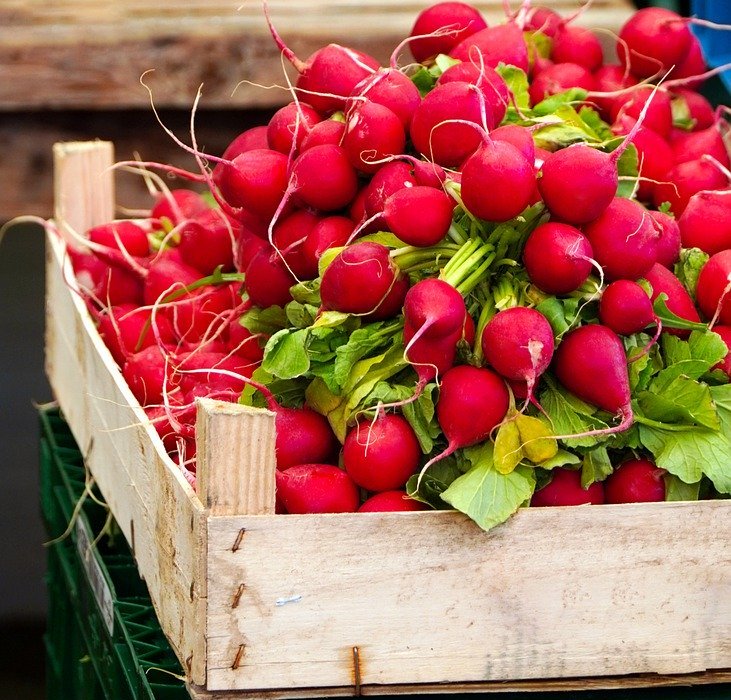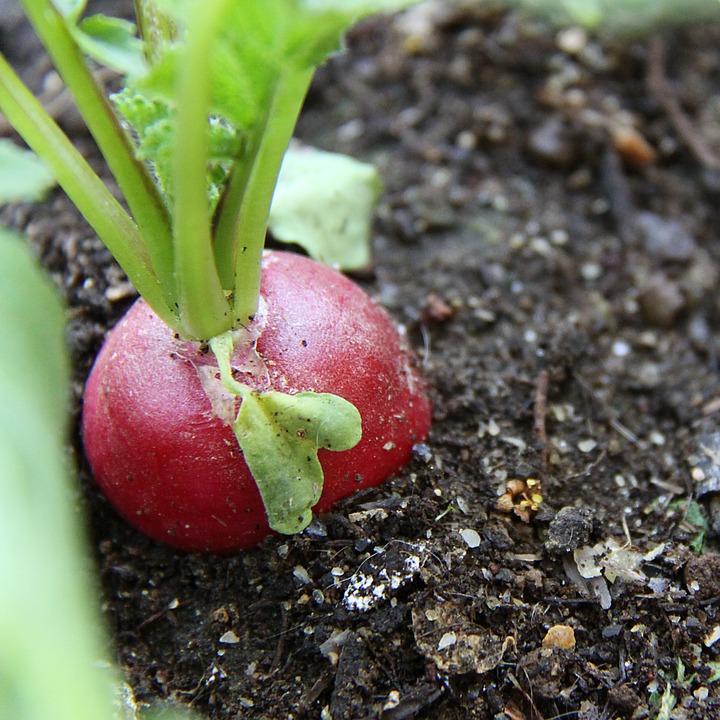This comprehensive guide will explore the fascinating world of radishes and rabbits, offering a detailed examination of whether these vibrant root vegetables are safe and beneficial for your furry companion. We'll delve into the nutritional composition of radishes, explore their potential advantages and risks for rabbits, and provide practical tips for safe and responsible feeding practices. Additionally, we'll address common questions related to radish consumption in rabbits, providing clear and insightful answers to ensure peace of mind for every bunny parent.
Part 1: The Nutritional Powerhouse: Unpacking the Value of Radishes

1.1: A Spectrum of Vitamins and Minerals
Radishes are a nutritional powerhouse, boasting a wide range of essential vitamins and minerals that contribute to overall well-being. Their vibrant red flesh is packed with:
- Vitamin C: A potent antioxidant that supports immune function, aids in collagen production, and contributes to healthy skin and connective tissues. A single radish can provide a significant amount of vitamin C, essential for protecting against free radicals and supporting overall health.
- Vitamin B6: Plays a crucial role in the production of red blood cells, the metabolism of protein and carbohydrates, and the synthesis of neurotransmitters essential for brain function and mood regulation.
- Folate: Essential for cell division, growth, and DNA synthesis, making it particularly important during pregnancy and periods of rapid growth. It also plays a role in the production of red blood cells and the prevention of neural tube defects.
- Potassium: A vital electrolyte that regulates fluid balance, muscle contractions, and nerve function. It contributes to healthy blood pressure and supports overall cardiovascular health.
- Magnesium: Plays a vital role in bone health, muscle function, and blood sugar control. It also supports energy production and promotes a healthy nervous system.
1.2: A Low-Calorie, High-Fibre Feast
Beyond their rich vitamin and mineral content, radishes offer a compelling combination of low calories and high fibre content, making them a potentially healthy addition to a rabbit's diet. Their low-calorie nature helps prevent weight gain, while the high fibre content promotes digestive health and regularity, contributing to a healthy and comfortable digestive system.
1.3: Understanding the Fibre Content
Radishes are particularly rich in insoluble fibre, which acts as a bulking agent in the digestive system. This type of fibre promotes regularity and helps prevent constipation by adding bulk to stool. However, it's crucial to note that excessive fibre intake can lead to digestive upset, highlighting the importance of moderation in feeding radishes to rabbits.
Part 2: Radishes and Rabbits: A Safe Relationship?

2.1: The Verdict: Yes, but with Cautious Consideration
Generally, radishes are safe for rabbits to consume in small quantities. However, certain factors must be considered to ensure their safety and well-being. The key lies in understanding the potential risks and implementing responsible feeding practices.
2.2: The Potential for Digestive Upset: Understanding the Risk
While radishes are generally safe, their high fibre content can potentially lead to digestive upset if consumed in excess. This is particularly true for rabbits with sensitive digestive systems or those accustomed to a low-fibre diet. Sudden changes in diet can cause discomfort, leading to bloating, diarrhoea, or lethargy.
2.3: The Importance of Freshness: Ensuring Quality and Safety
Only offer fresh, unblemished radishes to your rabbit. Wilted, damaged, or rotten radishes can harbour bacteria and toxins that may cause illness. Ensure the radishes you provide are firm, crisp, and free from any signs of decay.
Part 3: Navigating the Art of Feeding Radishes: A Guide to Safe Practices
3.1: A Gentle Introduction: The Importance of Gradual Adaptation
Introduce radishes gradually, offering just a small piece initially. This allows your rabbit's digestive system to adapt to the new food and minimize the risk of digestive upset. Observe your rabbit closely for any signs of discomfort, such as bloating, diarrhoea, or lethargy. If any adverse reactions occur, discontinue feeding radishes immediately and consult your veterinarian.
3.2: Selecting the Right Variety: Choosing the Best Fit for Your Rabbit
While all types of radishes are generally safe, smaller varieties like cherry radishes or French breakfast radishes are often easier for rabbits to consume due to their smaller size and tenderness. These varieties are less likely to cause choking or digestive issues, making them a safer option for smaller or less experienced rabbits.
3.3: Washing Thoroughly: Ensuring Cleanliness and Safety
Always wash radishes thoroughly under cold running water to remove any dirt, pesticides, or bacteria that may be present. This is crucial to prevent the transmission of harmful substances to your rabbit, ensuring their health and safety.
3.4: Treating Radishes as a Treat: Maintaining a Balanced Diet
Radishes should be offered as an occasional treat, not as a staple food. A healthy rabbit diet should consist primarily of fresh hay, supplemented with a small amount of fresh greens and a high-quality rabbit pellet food. This balanced diet provides the essential nutrients necessary for your rabbit's optimal health.
Part 4: Exploring the Potential Benefits: Enhancing Your Rabbit's Well-being
4.1: Supporting Dental Health: The Power of Crunchy Treats
The fibrous texture of radishes can help wear down your rabbit's teeth, promoting dental health and preventing overgrowth. This is crucial for rabbits, whose teeth continuously grow throughout their lives. Chewing on firm and fibrous treats like radishes helps maintain healthy teeth and prevents dental problems.
4.2: Promoting Digestive Health: A Gentle Boost for Digestion
The high fibre content in radishes can aid in the regulation of digestion and help prevent constipation. The insoluble fibre acts as a bulking agent, increasing the volume of stool and promoting regular bowel movements. However, remember to introduce radishes gradually to prevent digestive upset.
4.3: Providing Antioxidant Support: A Defence Against Damage
The antioxidants found in radishes can help protect cells from damage caused by free radicals, potentially contributing to overall health and well-being. Antioxidants play a crucial role in fighting oxidative stress, which can contribute to various health problems.
Part 5: Unveiling Potential Risks and Considerations: A Guide to Informed Feeding
5.1: Digestive Upset and Gas: The Importance of Moderation
As mentioned earlier, excessive radish consumption can lead to digestive upset and gas production, especially in sensitive rabbits. This highlights the importance of offering radishes in moderation and observing your rabbit for any signs of discomfort.
5.2: The Risk of Pesticide Exposure: Choosing Organic Options
Conventionally grown radishes may contain pesticide residues. Opt for organic radishes whenever possible to minimise pesticide exposure. Choosing organic produce ensures that your rabbit is not exposed to harmful chemicals.
5.3: The Importance of Variety: Ensuring a Balanced Diet
While radishes offer certain benefits, it's crucial to provide a diverse diet for your rabbit to ensure they receive a complete range of nutrients. A balanced diet, including various fresh hay, greens, and a high-quality rabbit pellet food, ensures that your rabbit receives all the essential vitamins and minerals for optimal health.
Part 6: Unveiling the Answers: Addressing Common Questions
6.1: Can rabbits eat radish tops?
Yes, radish tops are also generally safe for rabbits to eat, offering similar nutritional benefits to the root. They are rich in vitamins, minerals, and fibre, contributing to your rabbit's overall health. However, ensure the tops are fresh and washed thoroughly before feeding.
6.2: How often can I give my rabbit radishes?
Radishes should be offered as an occasional treat, no more than 1-2 times per week. Start with a small piece and observe your rabbit's reaction. If they tolerate it well, you can gradually increase the amount.
6.3: Can baby rabbits eat radishes?
It's best to avoid giving radishes to baby rabbits under 4 months old, as their digestive systems are still developing. Their delicate digestive systems may not be able to handle the high fibre content of radishes.
6.4: Can rabbits eat radishes with the skin on?
Yes, rabbits can eat radishes with the skin on. The skin contains additional nutrients and fibre. However, ensure the radish is thoroughly washed to remove any dirt or pesticides.
6.5: What if my rabbit shows signs of digestive upset after eating radishes?
If your rabbit exhibits signs of digestive upset after consuming radishes, discontinue feeding them and consult your veterinarian for guidance. They may recommend a bland diet or other supportive care to alleviate discomfort and aid in recovery.
6.6: Are there any specific breeds of rabbits that shouldn't eat radishes?
Generally, all breeds of rabbits can safely consume radishes in moderation. However, it's always wise to consult your veterinarian for breed-specific dietary recommendations.
6.7: Can I cook radishes for my rabbit?
While radishes can be cooked, it's generally recommended to offer them raw to your rabbit. Cooking can reduce their nutritional content and make them less appealing to rabbits.
6.8: What are the signs of a healthy rabbit?
A healthy rabbit will exhibit the following characteristics:
- Active and playful: Rabbits are naturally curious and energetic. They should be active and interested in exploring their environment.
- Shiny coat and clear eyes: A healthy rabbit will have a shiny coat and bright, clear eyes. Dull fur and cloudy eyes can indicate underlying health problems.
- Normal droppings: Rabbits produce a significant amount of droppings, which should be firm and round. Soft or watery droppings can indicate digestive issues.
- Normal appetite and weight: Healthy rabbits have a good appetite and maintain a healthy weight. Any significant changes in appetite or weight can be a sign of illness.
Conclusion
Radishes can be a delicious and nutritious treat for your rabbit when offered in moderation and with careful consideration. By understanding the nutritional profile, potential benefits and risks, and safe feeding practices, you can ensure your furry companion enjoys the occasional radish treat while maintaining their overall health and well-being. Remember to always consult your veterinarian with any concerns or questions regarding your rabbit's diet.
Everyone is watching
-

Do Rabbits Lay Eggs? (The Surprising Truth)
OTHER TYPES OF PETSThis article will unravel the common misconception that rabbits lay eggs, exploring the fascinating world of r...
-

What's a Group of Rabbits Called? (A Comprehensive Guide)
OTHER TYPES OF PETSThis article delves into the fascinating world of rabbits, exploring the various terms used to describe a grou...
-

Can Rabbits Eat Grapes? A Guide to Safe Rabbit Treats
OTHER TYPES OF PETSThis comprehensive guide will explore the safety and suitability of grapes for rabbits, providing detailed inf...
-

Predators That Hunt Rabbits: A Guide to Natural Enemies
OTHER TYPES OF PETSI've always been fascinated by the circle of life, that delicate dance between predator and prey. Growing up ...
-

Are Rabbits Nocturnal Animals?
OTHER TYPES OF PETSThe question of whether rabbits are nocturnal animals is a fascinating one, with a surprisingly complex answer...
